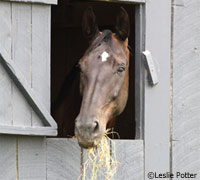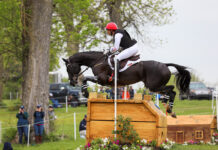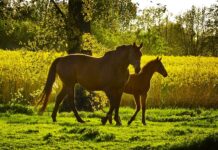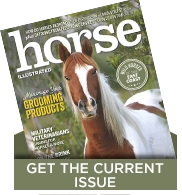
True or
false? Horses don’t need as much hay during the night because they sleep.
and dangerous. Equine nutrition expert Dr. Juliet Getty frequently has
to bust this myth. Believe the facts:
- Horses are awake and moving most of the time.
- Mature horses will sleep up to two hours per
day, broken into short periods. - These 15 to 20 minute naps are intermittent
throughout the day and night.
In other words, horses do
not sleep for long periods of time the way humans and some other animals do.
Being prey animals, horses must get their sleep in frequent breaks of short
duration, ideally in a group situation where some take turns resting while
others remain alert for dangers.
One more
fact to keep in mind:
- The horse’s digestion is designed to process
food continuously.
Horses are trickle
feeders, designed to graze continuously to keep the digestive system functioning
normally, thereby preventing ulcers and colic. Feeding them in sync with their
natural instincts and physiology requires that they have forage available any
time they want it. And that means 24/7.
The solution is simple:
Feed enough hay at night to make certain there is some left over in the
morning. If your horse runs out of hay and you wake to find him kicking and
pawing, he is hungry. But even if he seems to be waiting patiently, he may be in
discomfort or outright pain due to the acid bathing his empty stomach.
Certainly, he is also mentally stressed; this stress can lead to a multitude of
health problems (including, ironically, being persistently overweight).
Ease your horse’s
discomfort and keep his digestion healthy by giving him more hay than he
could possibly eat. Once he realizes the supply will never run out, he will
self-regulate and actually begin to eat less because he has relaxed, both
physically and emotionally. And you can sleep better, knowing that all
night long your horse is eating just the way he was meant to—like a horse.
Further Reading
Seven Feeding Myths Shattered
Dr. Juliet Getty has taught and consulted on
equine nutrition for more than 20 years. Her website, /redirect.php?location=www.gettyequinenutrition.com,
offers a library of helpful articles, a forum on nutrition, and a calendar of
appearances, teleconferences and interviews.







HMMM. I NEVER THOUGHT ABOUT IT THAT WAY, FEEDING MORE THAN THEY CAN EAT THRU THE NIGHT SO THEY WILL SLOW THEIR EATING AND BE BETTER FOR THEIR DIGESTION. ONE QUESTION, WHAT IF YOU ARE ON A STRICT BUDGET AND YOU CAN ONLY BUY ENOUGH HAY TO, SAY FEED 1-2 BALES PER DAY (NIGHT), AND YOU REALLY CANT AFFORD TO BUY/FEED MORE, SUCH AS 2-3 OR EVEN 4 BALES A DAY (NIGHT)? JUST CURIOUS.
HAVING A MINI AS MY HORSE’S PAL DOESNT EFFECT THE FEED AND HAY LIKE A FULL SIZE HORSE DOES, WHICH I LOVE. ITS THE MAIN REASON I GOT THE MINI IN THE FIRST PLACE. SO I AM ABLE TO FEED MORE HAY THAN I USE TO, WHEN I HAD 2 OR 3 FULL SIZE HORSES, CAUSE THE MINI DOESNT EACH MUCH AT ALL! THRU THE WINTER, I FEED GRAIN 2 TIMES A DAY, AND HAY 3 TIMES A DAY. WITH THE MOST HAY AT NIGHT TO HELP KEEP THE HORSES WARMER, AND TO MAKE UP FOR THE HRS IM ASLEEP AND UNABLE TO FEED, UNTIL BREAKFAST TIME. I GUESS IM ON THE RIGHT TRACK, RIGHT?
The problem is if I fed my horse as much hay as he wanted he’d look like a balloon. I give him a bit of hay at night but certainly not enough to last through the night. I break his feeding ritual into 4 times per day.
I like the idea of feeding a horse more naturally, and letting them free graze. But I found that when I put my horse on a big round bale (free feed) he would pig out because he had 2 pasture mates and felt like he had to eat competitively. (they slept in this pasture too, under trees). Any advice for this situation?
Nice to get so many comments regarding free-choice forage feeding. I understand your concerns and will be addressing them in the upcoming article, “Free Choice Forage Feeding: Beyond the Basics,” which will be in my next e-newsletter, Forage for Thought. If you are not currently on the mailing list, you can sign up at http://www.GettyEquineNutrition.com It is free, emailed monthly, and I believe you’ll find it helpful.
For those of you who are concerned with your horses eating too much, or too fast, you should try slow feeding nets. you can buy different brands and types, but you just fit it over the round bale (or small bale, or get slow feed hay nets for stalls). The holes are small, so the horses have to work harder to get the hay, and eat less. Plus there’s not as much waste, and it can save you tons of money. (while keeping horses fed and Occupied)
Thank you for writing this. I didn’t know about feeding at night before. (Luckily I don’t have a horse yet)
I think that horses don`t sleep that much becase there are predators and might attack the horse. the average horse gets only about 15 to 20 minute nap or more.
I started to feed at night just one year ago. A ANNCHP came over from the UK to France to help me go “barefoot” with my Appaloosa mare. She dropped into the conversation that she always fed her small herd their last hay nets just before going to bed bfor the reasons in this post. She wasn’t being critical or telling me I should. However when she left it just played over an dover in my head. It made sense. It felt right; So for the last year I have been doing just that and my horse and 5 ponies are looking very well of it and their Paddock Paradise.